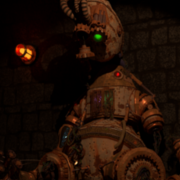Hi!
Thanks so much to everyone who answered.
(Sorry for my late answer, but I was busy wit shool)
First, some things simply come with age and there are some mistakes and failures one have to make himself  So, I would not totally obssess over it.
So, I would not totally obssess over it.
Second, you need more experience with coding (it will be very useful later) so I would not prevent this "rushing" (it's far better to learn coding well now while not finishing anything than learn how to design things flawlessly without getting the experience), you need this "fruitless" coding you are doing right now.
I know that I learn many things through "this" - And I already learned many things since I started - But it's just so... demotivating, always creating new projects, but never actually finishing one. I mean, sure, programming is fun - But it would be even cooler to see results, not just abandoned projects everywhere.
Do you have it on paper?  You sound like you are worrying too much about future and try to skip phases. You said you don't have your whole idea in your head yet, so the next step would be to finish it in your head and put on paper and only then worry about implementation.
You sound like you are worrying too much about future and try to skip phases. You said you don't have your whole idea in your head yet, so the next step would be to finish it in your head and put on paper and only then worry about implementation.
Learn how to code properly (so you understand your code the next day). Learn how to put your ideas on paper (I use various forums for this - as an added bonus I get (sometimes) a valuable feedback  ). Once you have these worry about implementation.
). Once you have these worry about implementation.
I'm gonna do that. It's just that I fear having problems if I don't have a "plan" for the implementation - It already happened quiet a few times that I was only stuck because I just had no idea what part of my project to implement next.
I've gotten in the habit of writing (typing actually) my thoughts down in a seperate file before, while, and after I code. And when working on the actual code, I put a comment that is just today's date so I can refrence my notes later if I have to. Over all, this helps me remember what I was doing last time and also when I come to a piece of code where I go, "what the hell was I thinking when I wrote this crap?" I can refer to my notes and actually answer that question. I do this for both my hobby projects and professionally (I'm not a game dev though).
I think I will do something like that, thanks for the reply!
Aside from that, experience is probably going to be what helps you determine what you need when in the design phase. Think about what went wrong last time and try to plan ahead to avoid that situation again. Think about the features your going to develop and the risks are involved. And write all these things down.
One of my problems is, is that I don't really know what went wrong. As I said in my first post, I think it's because I did not plan anything, and thats what I currently want to change

That being said, for my current hobby project, I have no real design. I'm basically just developing various features and don't really have any sort of game. Ultimately, I expect the project to collapse under its own weight. It's kinda close to that actualy as I'm finding issues between SFML and my target machine's ancient graphics card. Also, I recently decided that the way I structured my objects was giving me no end of grief and I had to spend a week or two restructuring things and accounting for those changes as well (was really close to giving up there). Plus there's a couple other ideas for projects that I got in my head that I'm curious to try and the current project has been going on for about two years without a lot of progress towards an actual game. Of course, those ideas would be quite unable to make use of anything that I've developed in the past two years too. So um... yeah... plan ahead as best as you can or else you'll probably end up with a mess like I have on my hands at the moment.
You probably have the same problem I have with your project (Only that mine isnt important). Well, good luck with it!
There's info in lots of places about how to write a GDD. You can start here:
http://www.sloperama.com/advice/specs.htm
http://www.sloperama.com/advice/lesson13.htm
Thank you for the links!
This conversation is taking place in the Game Design forum (I think someone moved it here from For Beginners). But implementing a game (after the GDD has been written) is not a proper subject for discussion in the Game Design forum. So you can post your programming questions in For Beginners.
I will do that, thanks!
@Navezof
Thanks for the reply!
About the modules: I'm already trying to do so as much as possible, and, uhm, wanted to say something here but I forgot...
About "Third": Wow, that's a really awesome idea! Never thought about that. I always just started to code the game and tried to take it as far as possible, thus most of the time I had not any "launchable" version... Gonna do that!
About "Fourth": By "you can work on the content of the module", do you mean the actual code? Or just details about this module?
About "Five": Let's hope it won't take that long

About "documenting": I will try to comment the code more. I just always forgot about comments while programing, and a few days later I understood nothing..
Thank you very much for the reply

@Misantes
Thanks for the reply!
The "template-system" seems pretty good - But how do you know how "far" to take it? Every style of game can have such unique games, isnt it a bit impossible to create a template fitting for many without having too many restrictions?
Also, sometimes aim lower. Plan to make something you know you can finish
Well, I've already finished plenty of little projects, but none of theres were games, they were just little tools for something. And I don't have so many ideas for games, so I actually want to get the joy to finish one of these ideas. I started with "game-developing" by just cloning existing games like Tetris, etc, but it became boring very soon.
@valrus
I can't really separate those two, since I'm "all alone" - I want to program a game, but I have to get the ideas by myself. As my first post may suggest, I'm... really new to game design, but I just can't avoid it, I think.
The idea with the physical design seems awesome, but I just can't think of a way to do something with my current ideas ^^
Again, thanks everyone for the replys

!!
And sorry for my bad english.
Greetings,
-
![]()










